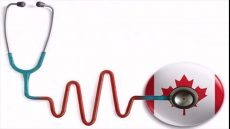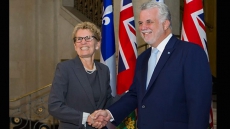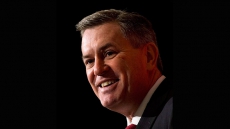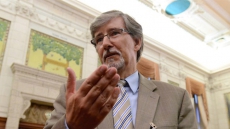Stephen Harper is drawing parallels between the Islamist militants who have seized a swath of territory across Iraq and Syria and the Taliban insurgents who controlled much of Afghanistan before the U.S.-led invasion.
The prime minister said Thursday he's been appalled by the recent violence, notably the beheading of American journalist James Foley by the al-Qaida splinter group known as the Islamic State in Iraq and the Levant.
"This is not unlike the situation that we had in Afghanistan prior to 2002," Harper said during a stop in Whitehorse, Yukon, on the first full day of his annual northern tour.
"Essentially you had a terrorist group establishing control of a large territory, essentially establishing a form of governance, and potentially using that to become a haven and a training ground for terrorism not just in the region, but across the world.
"And that, obviously, is a very big concern for all of us."
Harper said he agrees with U.S. President Barack Obama and others that the actions of ISIL cannot go unchecked.
"The violence — really, just unspeakable barbarism — that is occurring now across a vast territory, the desire to essentially commit genocide against any group of people in the region who are different, these are shocking developments."
Two of Canada's military cargo planes will be shuttling weapons to Kurdish forces in northern Iraq as part of a multinational effort to fight the militants.
Earlier in the day, Harper revealed plans for a multimillion-dollar Arctic-focused National Research Council program to explore resource development, transportation and shipping, marine safety technologies and community infrastructure.
The federal government is spending $17 million on the program over eight years, and will be seeking another $65 million in co-investments from industry over that same time period.
Harper, who made the announcement after a tour of Yukon College, said the program will help bridge the gap between laboratory research and the marketplace.





